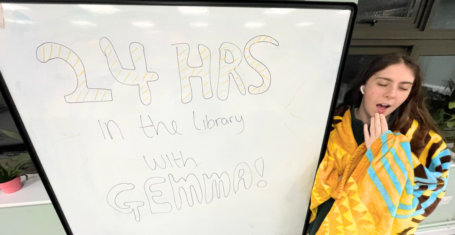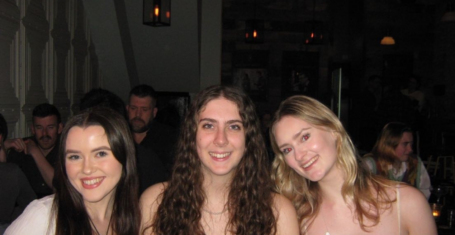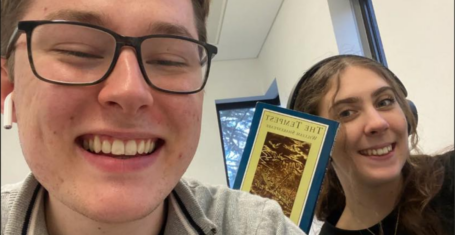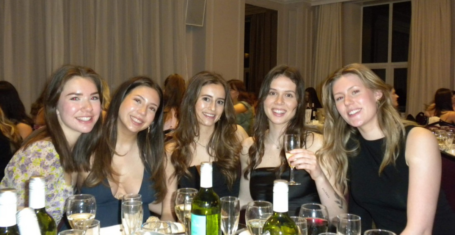
The Drop Meets…the Archdeacon of Exeter
The Venerable Christopher Futcher talks free will, forgiveness and freshers. Matt McDonald reports.
Religion. For many of us students, the “R” word represents something we push to one side for the duration of our time here; something from our past that we try to phase out due to its perceived irrelevance to our current lifestyle. I for one used to be a devout Christian: attending church every Sunday, going to faith schools my whole life and even running the Christian Union at my Sixth Form.
But then something changed in my life when I was around aged 17; whether it was that I felt I had been forced into it, whether I considered it stuffy and outdated or whether I foresaw that it would be incompatible with my way of living in a few years time, I can’t say.
What I can say is that Christianity undoubtedly had a significant shaping influence on my upbringing – how could it not be with a lapsed Irish Catholic father and a piously Anglican mother and sister? This personal rebellion I embarked upon emerged due to a build-up of unanswered questions and was ignited by a dramatic change in my living circumstances: coming to university.
I met with the Venerable Christopher Futcher, our new Archdeacon of Exeter and my uncle, to try and pick to pieces the nature of the relationship between faith and university life. Then I added some silly quickfire questions to make it all a bit more “Exeter Drop”.
MMc: So what is an archdeacon? What aspects of the role make it unique?
CF: An archdeacon is a member of the bishop’s personal staff – so my authority comes on his behalf; specifically concerning people, money, buildings…resources for the Church’s ministry basically. Beyond that, the role entails encouraging people, supporting people, and interpreting diocesan policy within the context of specific parishes.
MMc: Why is there an admission fee to go into the Cathedral? I mean, even though it’s Exeter’s main tourist attraction, should anyone ever pay to go into a church?
CF: I’m glad that you pointed out that it’s a tourist attraction – the Cathedral is sustained by donations, and tourists pay admission only when they are coming to view the Cathedral in this capacity. If someone wanted to come to the Cathedral to pray, or for a service, they wouldn’t have to pay admission.
MMc: The Cathedral Green was the main camp for Occupy Exeter last year. Would you have followed the example set by Giles Fraser at St. Paul’s?
CF: I think the main thing about the Occupy campaign was that it highlighted our need as a society for better vehicles for public and popular debate about world politics. The problem with the movement, I feel, is that the term “occupy” itself is problematic: to take up occupation is arguably invasive. With the Exeter site, as the occupation continued, hygiene and sanitation grew into issues. When a protest lasts for the length of time that Occupy Exeter did, I think it runs the risk of making the message less clear.
MMc: So what’s your view on the occupation of Palestine?
CF: Ha, phrasing your question like that gives a clear indication of your view on it! The Israel/Palestine situation is doubtless a frightful story of dispossession. My view is that it will take huge forgiveness and generosity on both sides in order for a solution to emerge.
MMc: Do you think that the Church of England will split over the gay marriage issue?
CF: I honestly don’t know. Given how controversial the subject is, of course there are trenchant views on it. I think the Church has to remember that there is a world outside the Church – but also the world has to remember that Church law differs from national law. Personally, I believe there should be a Christian way of blessing those relationships – I think that’s one possible development. However, you’ve got to remember that it took the Church a long time to accept divorce, and to drop the terms “spinster” and “bachelor” from the reading of the banns of marriage.
MMc: Do you have a secular hero?
CF: I’d say Nelson Mandela, in that he’s not celebrated for work done in the Church. He’s more of a political hero.
MMc: Let’s talk a bit about Christianity and students. What was your student experience like?
CF: Well, I studied at Edinburgh in the 70s. I wasn’t a member of the Christian Union, but I regularly worshipped at whichever church I lived nearest to. I think the freedom to worship in different places was a pretty important part of my student experience – it’s something I’d recommend to anyone at the university here.
MMc: If you weren’t in the ministry, what do you think you’d be doing?
CF: I think I’d be either a lawyer or a teacher. But then I’ve known I’d be a clergyman since I was 16, so I can’t say for certain.
MMc: If Jesus was a fresher, what societies would he join?
CF: Well, he did a lot of walking, so I expect the Out-of-Doors Society. He was charitable, so RAG would make sense…he loved table talk and grappling with truth, so I wouldn’t rule out the Debating Society. Probably the Jewish Society as well.
MMc: Looking at the stereotypical representation of the British student in the media and the hedonistic lifestyle adopted by many students, would you say that it’s wholly incompatible with Christian teaching, or is there potential for crossover?
CF: I’d certainly say that it appears that students have a very different lifestyle to 36 years ago – but then it’s a very different society. I also haven’t lived in a student city for a long time, but I’m sure it’s still true that universities remain a great place to get involved in issues and expand one’s worldview. I also think that the gap year is an extraordinary way of doing this. As for the “hedonistic lifestyle”…well, there’s evidence that it’s a bad idea and can cause long-term health problems.
MMc: OK, now for some quickfire questions. Church of England or Catholicism?
CF: Church of England. Nice try!
MMc: Bread or wine?
CF: Bread.
MMc: Matthew, Mark, Luke or John?
CF: Mark – it’s the earliest Gospel, the shortest, the simplest and the most direct.
MMc: Determinism or free will?
CF: Free will.
MMc: Exeter Chiefs or the Grecians?
CF: I prefer football, I’ll go with Grecians.
MMc: Your favourite prophet?
CF: I’ll say Isaiah, mainly because the writing is so extraordinary.
So there you have it: the Church of England in Exeter in a nutshell. I’ll leave it up to you as to whether you rise early on a post-Lemmy Sunday morning and hit the city’s many churches. But it is nonetheless worth thinking about.









































